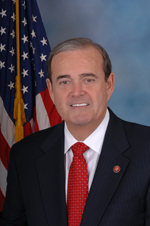 Rep. Jerry Costello (D-Ill.)
Rep. Jerry Costello (D-Ill.)
Leaders of the House aviation subcommittee told the Transportation Security Administration (TSA) March 10 that they are unconvinced that the agency’s proposed Large Aircraft Security Program is necessary.
In a roundtable discussion that included AOPA, key committee members indicated they thought the TSA proposal goes too far by attempting to impose airline-style security regulations on general aviation aircraft. Others noted that the TSA has far more urgent concerns than general aviation, while still others said the TSA had failed to convince them that GA represents a terrorist threat.
“We had a very productive roundtable and a wide-ranging discussion,” said Rep. Jerry Costello (D-Ill.), chairman of the aviation subcommittee. “I believe this proposed rule is a solution in search of a problem and we will be monitoring it very closely. If the rule is formalized in its current state, we will seek legislative action.”
Participating Committee Members
Chairman Jerry Costello (D-Ill.)
Ranking Member Thomas Petri (R-Wis.)
Rep. John Boozman (R-Ark.)
Rep. Leonard Boswell (D-Iowa)
Rep. Charlie Dent (R-Pa.)
Rep. John Duncan (R-Tenn.)
Rep. Vernon Ehlers (R-Mich.)
Rep. Dan Lipinski (D-Ill.)
Rep. Lynn Westmoreland (R-Ga.)
At the meeting, TSA Assistant Administrator John Sammon said that general aviation is not regulated today, and that’s why airspace restrictions must be in place. He added that TSA doesn’t know who is in the airplane or what they are carrying.
But general aviation is regulated in a variety of ways and pilot identities are no secret.
“The government knows exactly who I am and what I fly,” AOPA President Craig Fuller told the roundtable. “They know where I live, and I have to get a medical every two years.”
Following the meeting Rep. Leonard Boswell (D-Iowa) noted that passengers are also known to pilots, and that general aviation, and the entire country could be seriously hurt by the proposal.
“There is no doubt in my mind that the Large Aircraft Security Program as proposed by TSA would have devastating consequences for the GA community. This proposal is shortsighted, and does not take into account the many uses of GA operations across the country,” said Boswell. “The pilot-in-command knows who is on the airplane and by no means would take anyone who may be inappropriate. This is a totally different situation from a pilot-in-command on a commercial flight who may have several hundred passengers on board.
“The economic impacts on communities across the nation, particularly in rural America where GA is an attractive transportation option to attract business development, could impede economic growth, and in these uncertain economic times, this is the wrong approach,” added Boswell who last month sent a letter to the Department of Homeland Security expressing his concerns about the LASP proposal.
Rep. Vernon Ehlers (R-Mich.) put it even more strongly.
“One of the reasons I ran for public office was that I have always fought against stupid rules. This is a prime example of a stupid rule,” Ehlers said. “Simply put, the threat does not warrant this level of regulation. One might remember that the TSA issued a similarly stupid rule a few years ago which required all passengers flying into and out of Regan National Airport in Washington, D.C., to sit in their seats 30 minutes prior to landing and 30 minutes after takeoff. I was able to lead the charge in Congress to get that useless rule overturned—it passed the House of Representatives by unanimous applause. Hopefully, the TSA will scrap this proposed rule and Congress will not have to once again get involved.”
During the roundtable, Fuller also brought up AOPA’s Airport Watch program and the 866/GA-SECURE hotline to report possible terrorist activities. He noted that the small number of calls to that hotline indicates that GA is not a threat. In fact, some of the calls have come from concerned pilots over what turned out to be news media crews attempting to breach security.
Responding to the criticism, Sammon noted that the rule is still a proposal and the agency is going through a process to get the right answer. He promised a series of industry working groups to determine minimum weight, prohibited items, and who should be screened against a watch list.
“It was clear from our roundtable discussion that many members of Congress have serious concerns about the proposal and even the necessity of it,” said Ranking Member Rep. Thomas Petri (R-Wis.) after the meeting. “TSA has an important job to do, and we question whether general aviation should be a priority when TSA has limited resources to address real risks. TSA indicated they will continue the discussion with the general aviation community, but they really need to reassess their entire approach. I agree with my colleague Rep. Vern Ehlers who said, “I have a genetic defect, I hate stupid rules.”
Other committee members participating in the meeting were Rep. John Boozman (R-Ark.), Rep. Charlie Dent (R-Pa.), Rep. John Duncan (R-Tenn.), Rep. Dan Lipinski (D-Ill.), and Rep. Lynn Westmoreland (R-Ga.). Other aviation groups represented at the meeting included the American Association of Airport Executives, the Experimental Aircraft Association, the General Aviation Manufacturers Association, and the National Business Aviation Association.


